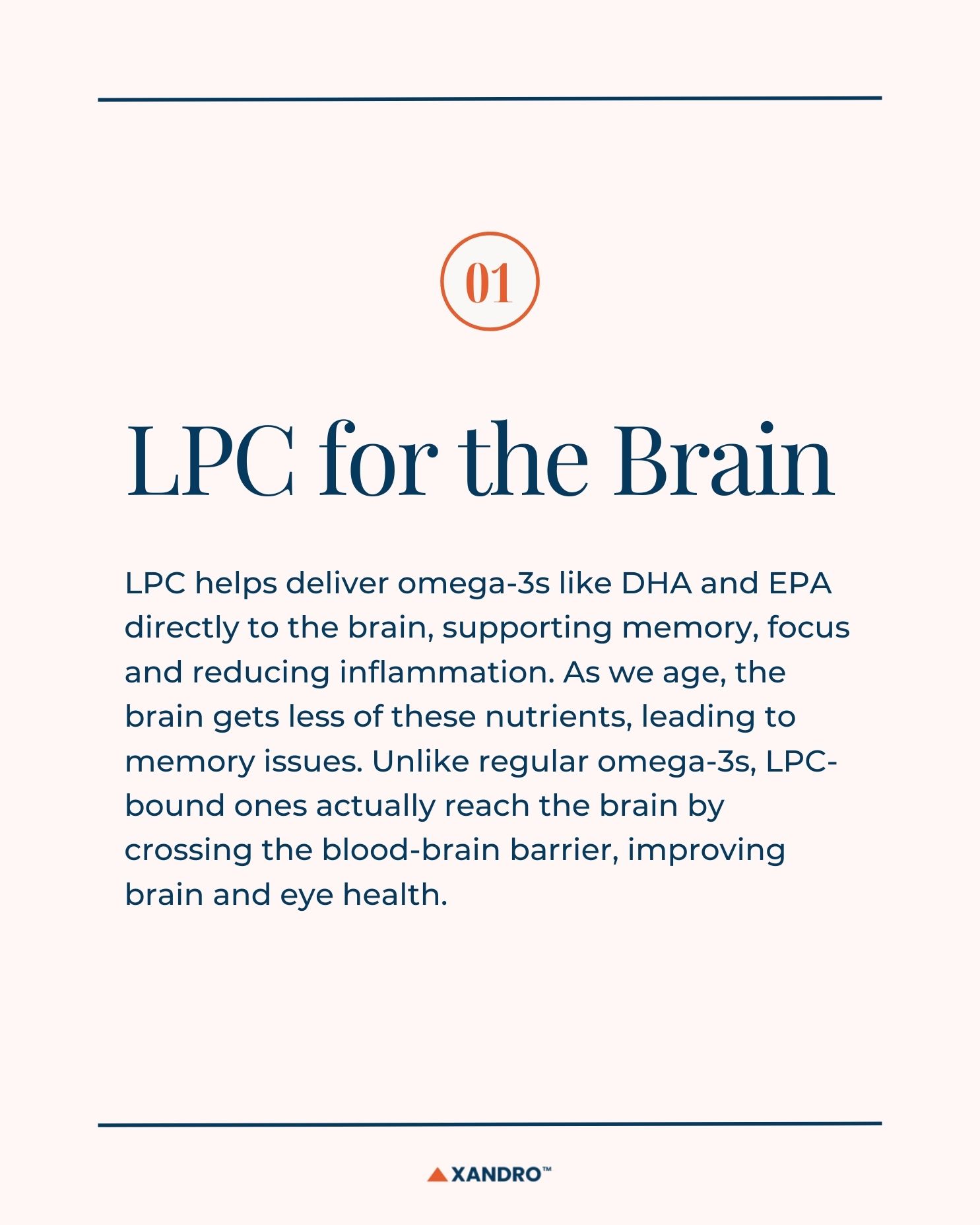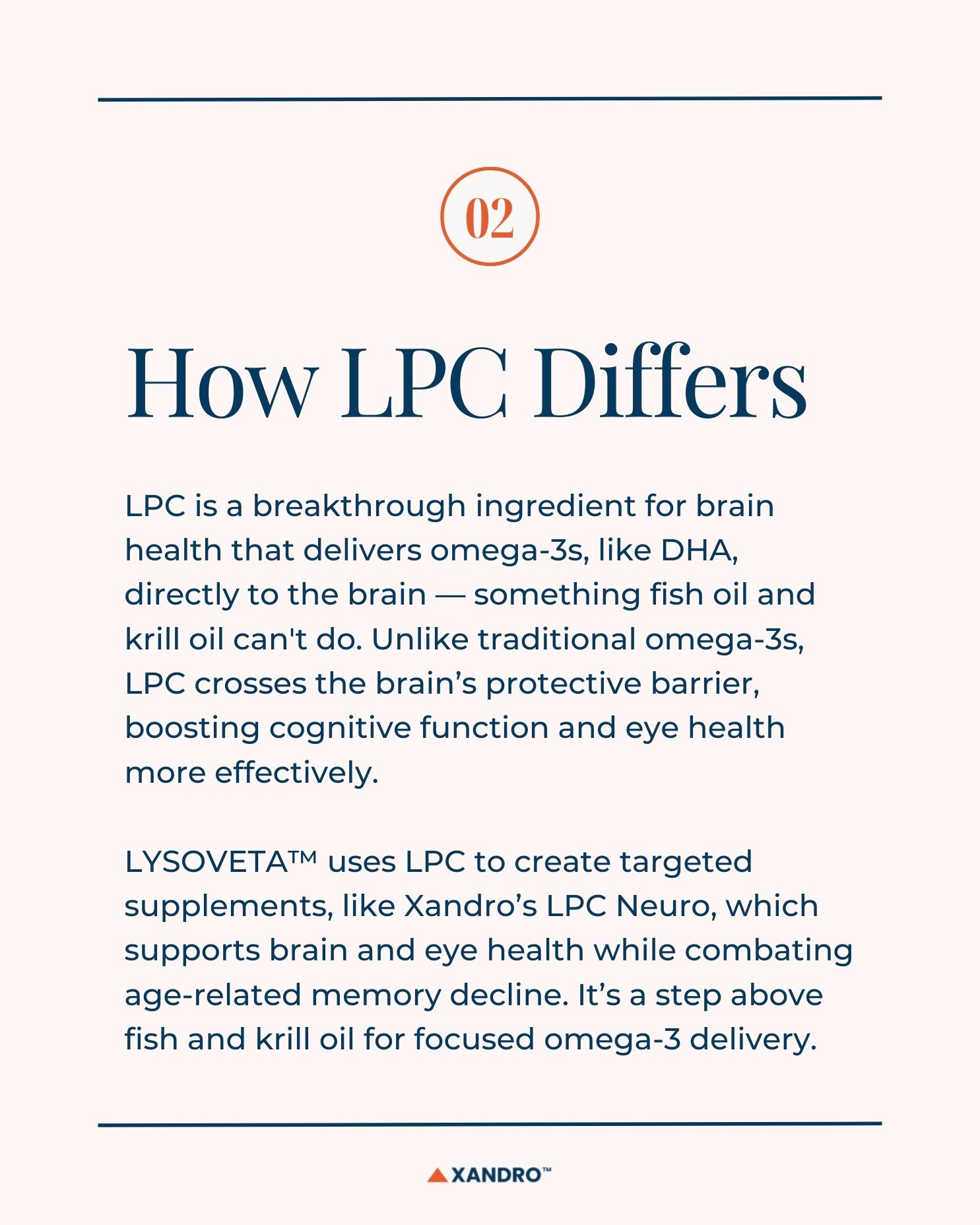LYSOVETA™ vs Krill Oil: Which Omega-3 Supplement is Right for You?
18th Jan 2025
LYSOVETA™ and LPC:The Future of Brain Health
As we age, declining brain health can hinder memory, decision-making and overall quality of life, hence why so many products are on the market that claim to target brain health.
By now, we’re sure you’ve heard that krill oil is far better than standard fish oil as an omega-3 supplement. This is why there are companies using krill oil in their omega-3 supplements, which contain phosphatidylcholine (PC).
Recently, further developments have been made to the omega-3 industry where it’s been found that a derivative of PC, known as lysophosphatidylcholine (LPC), is even better than krill oil omega-3s in supplements, especially for brain health.
Aker BioMarine has produced LYSOVETA™, which uses LPC-bound omega-3s, so this blog will go over what it is and how it differs from krill oil.
Jump there now:
- What is LPC and Why Does It Matter for Brain Health?
- Why LPC is the Key to Long-Term Brain Care
- The Science Behind LPC’s Superior Brain Uptake
- How LPC Differs from Krill Oil and Fish Oil Supplements
- Why take LPC Neuro vs Other Brain and Eye Health Brands
LPC is a naturally occurring molecule that plays an important role in maintaining brain health. It’s been found to be a great carrier for omega-3 fatty acids, particularly DHA (docosahexaenoic acid) and EPA (eicosapentaenoic acid), helping with their direct delivery to the brain. This targeted transport is important because the brain requires these fatty acids to maintain neuron membranes, support cognitive functions and reduce inflammation.
As we age, the brain's access to essential LPC-DHA declines, which can lead to cognitive decline and memory loss. Unlike standard omega-3 supplements that struggle to cross the blood-brain barrier, LPC-bound DHA and EPA can effectively penetrate this barrier and deliver omega-3s directly to the brain.
By replenishing neuron membranes and providing anti-inflammatory support, LPC-bound omega-3 supplements help to improve memory, focus and cognitive clarity, as well as help with eye hydration and eye health.
Further Reading: What is LPC EPA and LPC DHA?

Traditional omega-3 supplements, like fish oil, often contain DHA (docosahexaenoic acid) and EPA (eicosapentaenoic acid) bound to triglycerides or phospholipids. While these have their benefits, they face a big challenge: only a small amount of these forms actually reach the brain.
On the other hand, LPC-bound omega-3s are designed to bypass this limitation. They use a unique transport system to cross the blood-brain barrier — a shield that protects the brain from harmful substances.
The ability of LPC-bound omega-3s to efficiently reach the brain makes them a standout choice for anyone looking to maintain or improve their cognitive health. Unlike regular fish oils, which may struggle to deliver results due to poor absorption, LPC omega-3s make sure the brain gets what it needs to stay sharp, focused and resilient as we age.
LPC-bound omega-3s use a protein called Mfsd2a to efficiently cross the blood-brain barrier. This mechanism makes sure that the DHA and EPA are absorbed directly into brain cells, rather than breaking down along the way. Once inside the brain, these fatty acids can then:
- Maintain brain cell membranes
- Reduce inflammation
- Support cognitive functions like memory and focus
For those with cognitive concerns or risk of dementia LPC-DHA/EPA may provide extra protection, especially for individuals with genetic risks like APOE4, which is linked to Alzheimer’s disease. Studies suggest that higher levels of DHA in the brain are associated with better memory and cognitive performance.
Further Reading: All About the APOE4 Gene and Alzheimer’s Risk
LPC-bound omega-3s can reduce inflammation and support liver health, helping to improve non-alcoholic fatty liver disease (NAFLD). They can also help with post-exercise recovery as they improve antioxidant capacity and aid muscle recovery.
What’s more, DHA supports the retina, and LPC-DHA has shown promising results in preserving vision, and LPC-DHA levels have been linked to better outcomes after events like cardiac arrest or strokes. A 2024 study even found it may protect against neonatal brain injury.
Unlike krill oil or fish oil, which lack LPC and rely on non-targeted delivery, LPC sets a new standard in brain health by focusing on what truly matters — targeted, effective support.
If you’re interested in learning about the difference between krill oil and fish oil, read our article below. While krill oil benefits outweigh fish oil, it’s much more expensive and not a viable option for many individuals.
Further Reading: Krill Oil vs Fish Oil
LYSOVETA™, however, uses LPC, a different molecule to krill oil and one entirely different to fish oil. It’s a groundbreaking ingredient for brain health and one that will continue to be used in omega-3 supplements in years to come. Let’s go over some of the differences between PC and LPC.
PC and LPC are both lipid molecules that play important roles in our body's cell membranes:
Phosphatidylcholine (PC) Omega-3s:
- Structure: PC omega-3s are made of a glycerol backbone with two fatty acid chains, one of which is an omega-3 fatty acid like DHA or EPA, and a phosphate group linked to a choline molecule.
- Absorption and Delivery: When consumed, PC omega-3s are absorbed in the intestines and transported through the bloodstream to various tissues, but their efficiency in delivering omega-3s to specific organs, such as the brain, can be limited due to the body's metabolic processing.
Lysophosphatidylcholine (LPC) Omega-3s:
- Structure: LPC omega-3s are similar to PC but have only one fatty acid chain, which is an omega-3 fatty acid, due to the removal of the second fatty acid.
- Absorption and Delivery: LPC omega-3s have a unique advantage in crossing the blood-brain barrier, the protective shield around the brain. This means they can more effectively deliver omega-3s directly to brain tissues, potentially enhancing cognitive functions and supporting neurological health.
Key Differences:
- Bioavailability: LPC omega-3s are considered more bioavailable, especially for brain uptake, compared to PC omega-3s. This higher bioavailability means that a greater proportion of the consumed omega-3s reach the brain when delivered as LPC.
- Health Implications: Due to their efficient delivery to the brain, LPC omega-3s are being explored for their potential benefits in improving brain function and reducing the risk of cognitive decline. In contrast, PC omega-3s are beneficial for general health but may not target the brain as effectively.
Fish oil and krill oil do not contain LPC, while LYSOVETA™ does. This means that by taking a supplement with LYSOVETA™, such as Xandro’s LPC Neuro, you can target specific tissue, such as the brain and eyes, whereas krill oil and fish oil cannot.
Rather than thinking about LYSOVETA™ vs krill oil and which form of omega-3 is best for your health concerns, LPC is a new ingredient for brain health.
Further Reading: Why Standard Fish Oil Is Pointless for the Brain

Other than taking a multivitamin that contains a small amount of vitamins and minerals great for brain and eye health, such as vitamin K, magnesium and folate, omega-3 fatty acids are generally recommended for these areas. Currently, no other supplement on the market uses LPC, making supplements that use LYSOVETA™ the current best omega-3 supplements.
Xandro’s LPC Neuro LYSOVETA™ supplement is an LPC-rich oil for brain health that combats age-related cognitive decline and helps build important neuron membranes. This LPC DHA omega-3 supplement uses a special ingredient extracted from Antarctic krill.
When will LYSOVETA™ be available? It already is! Xandro’s LPC Neuro uses LYSOVETA™ in this LPC DHA/EPA supplement, but for transparency, you can also read our post about, ‘Where can I buy LPC DHA?’
Further Reading: Where to buy the best LPC DHA Supplement
End Note
In short, LPC omega-3s are a breakthrough in brain care, offering targeted support that could revolutionise how we think about ageing and cognitive health. Whether you're looking to boost your memory, protect against dementia or simply give your brain the nutrients it needs to thrive, LPC-bound DHA and EPA may hold the key to a brighter, healthier future. It’s truly the future of brain health supplements.
If you’ve been looking for a way to slow down age-related brain decline as you get older, LPC-bound DHA and EPA might be your best option. LPC Neuro is an LPC-bound omega-3 supplement that crosses the blood-brain barrier and, using LPC, it truly is the future of brain health.
Start taking care of your brain today with LPC — because your brain deserves more than just the basics.
Improve your health with Xandro. Science-First. Trusted Longevity Solutions.
